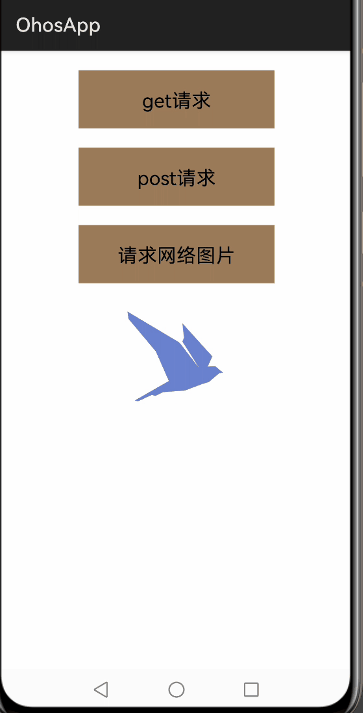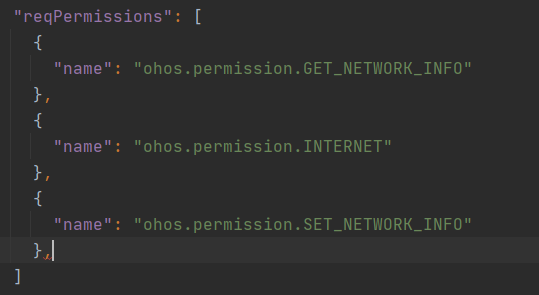
https://harmonyos.51cto.com
简介
在应用开发的过程中,网络请求是很常见的场景,其中常见是加载网络图片、访问后台接口等。在安卓系统中实现这些相信大家已经很熟悉了,
那么在鸿蒙系统中又有哪些相似与不同呢?今天给大家带来的是在鸿蒙系统中发起网络请求的使用示例,示例中包含了使用鸿蒙API完成get、post请求,加载网络图片等。
功能展示

开发概述
首先,使用网络模块的相关功能时,需要请求相应的权限。

添加在entry模块的config.json中

权限相关配置好后,接下来看一下鸿蒙开发官网上对于网络模块开发的接口说明
鸿蒙官网网络开发文档
文档中给出了网络开发的关键接口说明及网络开发的一般步骤,
1、调用NetManager.getInstance(Context)获取网络管理的实例对象。
2、调用NetManager.getDefaultNet()获取默认的数据网络。
3、调用NetHandle.openConnection()打开一个URL。
4、通过URL链接实例访问网站。
并且提供了网络状态的监听接口addDefaultNetStatusCallback(NetStatusCallback callback)
private final NetStatusCallback callback = new NetStatusCallback() {
@Override
public void onAvailable(NetHandle handle) {
//网络可用时
}
@Override
public void onBlockedStatusChanged(NetHandle handle, boolean blocked) {
//网络状态变化时
}
};
下面我们来编写下完整的网络请求实例
1、get请求
public void requestByGet() {
LogUtils.debug("NetRequestUtils requestByGet");
NetManager netManager = NetManager.getInstance(null);
if (!netManager.hasDefaultNet()) {
LogUtils.debug("NetRequestUtils network is null");
return;
}
ThreadPoolUtil.submit(() -> {
NetHandle netHandle = netManager.getDefaultNet();
netManager.addDefaultNetStatusCallback(callback);
HttpURLConnection connection = null;
try (ByteArrayOutputStream outputStream = new ByteArrayOutputStream()) {
URL url = new URL("http://www.baidu.com");
URLConnection urlConnection = netHandle.openConnection(url, java.net.Proxy.NO_PROXY);
if (urlConnection instanceof HttpURLConnection) {
connection = (HttpURLConnection) urlConnection;
}
connection.setRequestMethod("GET");
connection.connect();
//之后可进行url的其他操作
try (InputStream inputStream = urlConnection.getInputStream()) {
byte[] cache = new byte[2 * 1024];
int len = inputStream.read(cache);
while (len != -1) {
outputStream.write(cache, 0, len);
len = inputStream.read(cache);
}
} catch (IOException e) {
LogUtils.error("NetRequestUtils inner IOException");
}
String result = new String(outputStream.toByteArray());
LogUtils.debug("NetRequestUtils result:" + result);
getUITaskDispatcher().syncDispatch(() -> Toast.show("成功发起get网络请求:" + result));
HttpResponseCache.getInstalled().flush();
} catch (IOException e) {
LogUtils.error("NetRequestUtils IOException");
}
});
}
2、post请求
测试发现,只需要将connection.setRequestMethod();中的参数修改成“POST”即可
connection.setRequestMethod(“POST”);
3、网络图片加载
/**
* 请求网络图片
*/
public void requestNetImage() {
ThreadPoolUtil.submit(() -> {
String requestUrl = "https://t7.baidu.com/it/u=4162611394,4275913936&fm=193&f=GIF";
HttpURLConnection connection = null;
try {
connection = getHttpURLConnection(requestUrl, "GET");
connection.connect();
if (connection.getResponseCode() == HttpURLConnection.HTTP_OK) {
//将网络请求数据转换成ImageSource
ImageSource.SourceOptions srcOpts = new ImageSource.SourceOptions();
ImageSource imageSource = ImageSource.create(connection.getInputStream(), srcOpts);
//将ImageSource转换成可以设置给image控件的PixelMap对象
PixelMap pixelMap = imageSource.createPixelmap(null);
getUITaskDispatcher().syncDispatch(() -> image.setPixelMap(pixelMap));
}
connection.disconnect();
} catch (Exception e) {
LogUtils.error("NetRequestUtilsException requestNetImage:" + e.getMessage());
}
});
}
private HttpURLConnection getHttpURLConnection(String requestURL, String requestMethod) throws IOException {
URL url = new URL(requestURL);
HttpURLConnection connection = (HttpURLConnection) url.openConnection();
//设置连接超时时间
connection.setConnectTimeout(10 * 1000);
//设置读取服务器数据超时时间
connection.setReadTimeout(15 * 1000);
//设置请求方式
connection.setRequestMethod(requestMethod);
return connection;
}
在加载网络图片时,connection连接成功后,获取到的是一张图片的输入流。为了将图片输入流转化成可以显示的PixelMap对象,
需要先创建ImageSource对象,再通过imageSource.createPixelmap(null)创建对应的pixelMap对象,
最终通过image.setPixelMap(pixelMap));将图片加载到屏幕上。
以下是完整代码示例:
public class NetAbilitySlice extends AbilitySlice {
Image image;
@Override
protected void onStart(Intent intent) {
super.onStart(intent);
super.setUIContent(ResourceTable.Layout_slice_net);
findComponentById(ResourceTable.Id_btn_request_get).setClickedListener(component -> {
requestByGet();
});
findComponentById(ResourceTable.Id_btn_request_post).setClickedListener(component -> {
requestByPost();
});
findComponentById(ResourceTable.Id_btn_request_image).setClickedListener(component -> {
requestNetImage();
});
image = (Image) findComponentById(ResourceTable.Id_image_neturl);
}
public void requestByGet() {
LogUtils.debug("NetRequestUtils requestByGet");
NetManager netManager = NetManager.getInstance(null);
if (!netManager.hasDefaultNet()) {
LogUtils.debug("NetRequestUtils network is null");
return;
}
ThreadPoolUtil.submit(() -> {
NetHandle netHandle = netManager.getDefaultNet();
netManager.addDefaultNetStatusCallback(callback);
HttpURLConnection connection = null;
LogUtils.debug("NetRequestUtils ThreadPoolUtil.submit");
try (ByteArrayOutputStream outputStream = new ByteArrayOutputStream()) {
LogUtils.debug("NetRequestUtils URL.new URL");
URL url = new URL("http://www.baidu.com");
URLConnection urlConnection = netHandle.openConnection(url, java.net.Proxy.NO_PROXY);
if (urlConnection instanceof HttpURLConnection) {
connection = (HttpURLConnection) urlConnection;
}
connection.setRequestMethod("GET");
connection.connect();
LogUtils.debug("NetRequestUtils connection.connect");
//之后可进行url的其他操作
try (InputStream inputStream = urlConnection.getInputStream()) {
byte[] cache = new byte[2 * 1024];
int len = inputStream.read(cache);
while (len != -1) {
outputStream.write(cache, 0, len);
len = inputStream.read(cache);
}
} catch (IOException e) {
LogUtils.error("NetRequestUtils inner IOException");
}
String result = new String(outputStream.toByteArray());
LogUtils.debug("NetRequestUtils result:" + result);
getUITaskDispatcher().syncDispatch(() -> Toast.show("成功发起get网络请求:" + result));
HttpResponseCache.getInstalled().flush();
} catch (IOException e) {
LogUtils.error("NetRequestUtils IOException");
}
});
}
private final NetStatusCallback callback = new NetStatusCallback() {
@Override
public void onAvailable(NetHandle handle) {
LogUtils.info("NetStatusCallback onAvailable");
}
@Override
public void onBlockedStatusChanged(NetHandle handle, boolean blocked) {
LogUtils.info("NetStatusCallback onBlockedStatusChanged");
}
};
public void requestByGet1() {
String requestUrl = "https://www.baidu.com";
ThreadPoolUtil.submit(() -> {
HttpURLConnection connection = null;
try {
connection = getHttpURLConnection(requestUrl, "GET");
connection.connect();
String response = getReturnString(connection.getInputStream());
ZSONObject zsonObject = ZSONObject.stringToZSON(response);
LogUtils.info("NetRequestUtils requestByGet1 :" + zsonObject);
getUITaskDispatcher().syncDispatch(() -> Toast.show("成功发起get网络请求:" + zsonObject));
} catch (Exception e) {
LogUtils.error("NetRequestUtils requestByGet1 :" + e.getMessage());
}
});
}
public void requestByPost1() {
ThreadPoolUtil.submit(() -> {
String requestUrl = "http://10.55.20.48:8082/svnplus/fileSystem/uploadMoel?url=http://120.78.215.13/home/svn/666";
HttpURLConnection connection = null;
try {
connection = getHttpURLConnection(requestUrl, "POST");
connection.connect();
String response = getReturnString(connection.getInputStream());
ZSONObject zsonObject = ZSONObject.stringToZSON(response);
LogUtils.info("NetRequestUtils requestByPost:" + zsonObject);
getUITaskDispatcher().syncDispatch(() -> Toast.show("成功发起post网络请求:" + zsonObject));
} catch (Exception e) {
LogUtils.error("NetRequestUtilsException requestByPost:" + e.getMessage());
getUITaskDispatcher().syncDispatch(() -> Toast.show("成功发起post网络请求:" + e.getMessage()));
}
});
}
public void requestByPost() {
NetManager netManager = NetManager.getInstance(null);
if (!netManager.hasDefaultNet()) {
LogUtils.debug("NetRequestUtils network is null");
return;
}
ThreadPoolUtil.submit(() -> {
NetHandle netHandle = netManager.getDefaultNet();
HttpURLConnection connection = null;
try (ByteArrayOutputStream outputStream = new ByteArrayOutputStream()) {
URL url = new URL("http://10.55.20.48:8082/svnplus/fileSystem/uploadMoel?url=http://120.78.215.13/home/svn/666");
URLConnection urlConnection = netHandle.openConnection(url, java.net.Proxy.NO_PROXY);
if (urlConnection instanceof HttpURLConnection) {
connection = (HttpURLConnection) urlConnection;
}
connection.setRequestMethod("POST");
connection.connect();
//数据解析
try (InputStream inputStream = urlConnection.getInputStream()) {
byte[] cache = new byte[2 * 1024];
int len = inputStream.read(cache);
while (len != -1) {
outputStream.write(cache, 0, len);
len = inputStream.read(cache);
}
} catch (IOException e) {
LogUtils.error("NetRequestUtils inner IOException");
}
String result = new String(outputStream.toByteArray());
LogUtils.debug("NetRequestUtils result:" + result);
getUITaskDispatcher().syncDispatch(() -> Toast.show("成功发起post网络请求:" + result));
} catch (Exception e) {
LogUtils.error("NetRequestUtilsException requestByPost:" + e.getMessage());
}
});
}
/**
* 请求网络图片
*/
public void requestNetImage() {
ThreadPoolUtil.submit(() -> {
String requestUrl = "https://t7.baidu.com/it/u=4162611394,4275913936&fm=193&f=GIF";
HttpURLConnection connection = null;
try {
connection = getHttpURLConnection(requestUrl, "GET");
connection.connect();
if (connection.getResponseCode() == HttpURLConnection.HTTP_OK) {
//将网络请求数据转换成ImageSource
ImageSource.SourceOptions srcOpts = new ImageSource.SourceOptions();
ImageSource imageSource = ImageSource.create(connection.getInputStream(), srcOpts);
//将ImageSource转换成可以设置给image控件的PixelMap对象
PixelMap pixelMap = imageSource.createPixelmap(null);
getUITaskDispatcher().syncDispatch(() -> image.setPixelMap(pixelMap));
}
connection.disconnect();
} catch (Exception e) {
LogUtils.error("NetRequestUtilsException requestNetImage:" + e.getMessage());
}
});
}
private HttpURLConnection getHttpURLConnection(String requestURL, String requestMethod) throws IOException {
URL url = new URL(requestURL);
HttpURLConnection connection = (HttpURLConnection) url.openConnection();
//设置连接超时时间
connection.setConnectTimeout(10 * 1000);
//设置读取服务器数据超时时间
connection.setReadTimeout(15 * 1000);
//设置请求方式
connection.setRequestMethod(requestMethod);
return connection;
}
private String getReturnString(InputStream is) {
try {
BufferedReader reader = new BufferedReader(new InputStreamReader(is, "utf-8"));
StringBuilder sb = new StringBuilder();
String line = "";
while ((line = reader.readLine()) != null) {
sb.append(line).append("\n");
}
is.close();
return sb.toString();
} catch (Exception var5) {
return null;
}
}
}
总结
到此本篇文档就要告一段落了。通过本篇的学习,基本掌握了鸿蒙系统中的网络请求及网络图片加载。
最后跟大家分享一些开发过程中的注意事项.
1、鸿蒙系统中默认的网络请求地址格式是https,如果想要访问http网址,需要修改允许明文信息传输的配置.
同样在entry模块的config.json中(如果存在多个module,最好在每一个config.json文件中均添加上该配置).
"deviceConfig": {
"default": {
"network": {
"cleartextTraffic": true
}
}
},
2、网络请求是耗时操作,必须执行在子线程中,否则报错android.os.NetworkOnMainThreadException.
3、在加载网络图片示例中,我们将connection.getInputStream()数据流直接转换成了ImageSource。
但是再请求其他网络地址时,如访问www.baidu.com的返回结果就是html文件,因此在网络连接成功的后续数据处理中,需要注意数据格式。
https://harmonyos.51cto.com

 蜀ICP备20004578号
蜀ICP备20004578号